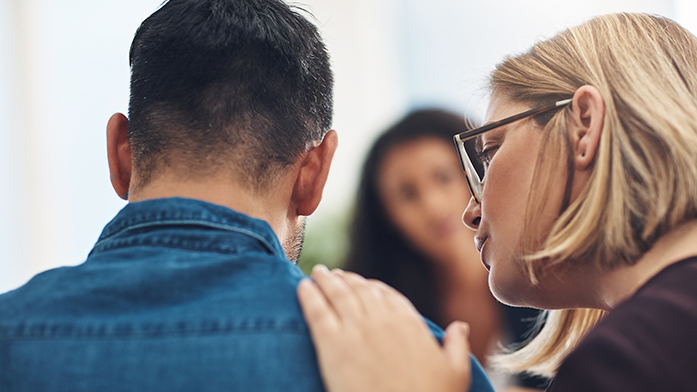Trauma

IN EMOTIONAL DISTRESS? CALL THE CRISIS HELPLINE
After a shooting, natural disaster or tragic events, people can feel stress, grief, guilt or anger. Difficult feelings can arise either immediately or at other times, especially when the anniversary of the event is coming up.
It's important to remember that there are ways to cope. You do not need to deal with difficult times alone.
If you would like to speak with a professional, Ventura County Behavioral Health encourages residents to call the crisis team. They are available 24 hours a day, 7 days a week. Help is available in English, Spanish, and other languages.
Ventura County Crisis Team
1-866-998-2243
If you believe your loved one is experiencing a mental health crisis and you need the assistance of law enforcement, call 911.
••••••••••••
Local Resources:
Ventura County Crisis Team:
1-866-998-2243
(24 hours a day, 7 days a week)
Emergency: Call 911
Interface Children & Family Services
www.icfs.org
Call 1-800-636-6738
Services offered:
• Family Violence Response Team
• Safe Haven Emergency Shelter
• Safe Journey Transitional Shelter
• Women’s Support Group
2-1-1 Ventura County Information & Referral
Call 2-1-1
Project Connecting with my Peers:
Educating women about the early signs of depression
Oxnard: (805) 483-1166
Santa Paula / Fillmore: (818) 427-5444
Clinicas del Camino Real
clinicas.org
Oxnard, Santa Paula, Simi Valley, Thousand Oaks, Ventura
(805) 647-6353
The Coalition for Family Harmony
thecoalition.org
24-Hour Bilingual Hotline:
1-800-300-2181
Email: gethelp@thecoalition.org
National Resource:
The National Domestic Violence Hotline
thehotline.org
Call 1-800-799-7233, 24 hours a day, 7 days a week
Anonymous & confidential
WHAT IS TRAUMA?
When a devastating event disrupts your life, all of a sudden everything changes. You cannot return to your usual routine — you may have lost your home, or a loved one, or experienced a serious injury or illness. At first, you may feel “stunned,” “shaken up,” “beaten down,” or “numb all over.” These are normal reactions to traumatic events.
Mental trauma can produce strong feelings. It can also produce extreme behavior; such as intense fear or helplessness, withdrawal or detachment, lacks of concentration, irritability, sleep disturbance, aggression, hypervigilance – intensely watching for more distressing events, or flashbacks — the sense that the event is reoccurring.
A response could be fear. It could be fear that a loved one will be hurt or killed. It is believed that more direct exposures to traumatic events causes greater harm. For instance, in a school shooting, an injured student will probably be more severely affected emotionally than a student who was in another part of the building. However, second-hand exposure to violence can also be traumatic. This includes witnessing violence such as seeing or hearing about death and destruction after a building is bombed or a plane crashes.
The path back to wellness may take longer than you expect. It is important to remember that people can help you in important ways, and that it can be a good idea to ask for assistance.
WAYS TO COPE – MENTAL WELLNESS
After a traumatic event, coping with stress and trauma is important from Day 1. Don't ignore your mental health. We each have different needs and different ways to cope. There are several things you can do to help care for yourself or a loved one.
- Avoid overexposing yourself and loved ones to the incident via the news or social media
- Work on meditation, breathing, and muscle relaxation techniques
- Eat healthy foods
- Exercise
- Get enough sleep
- Participate in activities you don't find stressful, such as sports, hobbies or social events
- Participate in meaningful cultural activities, including spiritual communities
- Talk to your healthcare provider or a mental health professional
- Stay alert – don't overdo alcohol or use other drugs as a way to cope with stress. Learn more about the risks at www.venturacountylimits.org
Sharing reactions, thoughts, and emotions can be helpful for some people, but others may not want to share. Be sensitive to one another and speak in private, as not everyone will want to hear these conversations. It’s important to focus on personal experiences and established facts, not rumors.
HELPING CHILDREN
Sources: National Institute of Mental Health. SAMHSA
